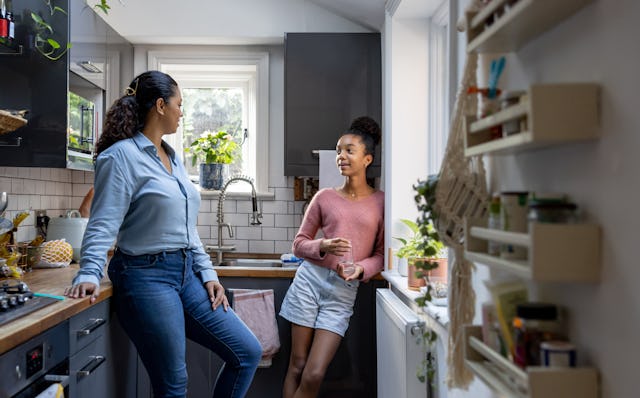Sneaky Signs Your Kid Craves Some Connection (& How Not To Blow It)
Your child is never going to say, "I’d love to have a word with you." But these actions speak as loud as those words.

Little kids hop right in your lap when they want you. Big kids, including teens and tweens, are more awkward. They often seem angry — and yet, at a moment's notice, might really crave your attention. Since they're famously bad at verbalizing their confusing feelings, it's up to you to try and read the signs that your kid is craving some connection.
Their body language usually signals first.
Albert Mehrabian, a researcher and author of the 1972 book Silent Messages, found that communication is 55% body language, 38% tone of voice, and 7% words. That's still widely accepted and called the 55/38/7 rule (or the 7/38/55 rule, it's written both ways). It means that what's unsaid is paramount, and when my 17-year-old comes and plops on my bed while I'm reading, even if he says nothing and shuts his eyes, he's using body language to communicate that he wants some mom time.
"Pay attention to your child's body language. Usually, they signal that they want to connect just by showing up," says Julie A. Ross, executive director of Parenting Horizons (she also does the Parenting Horizons podcast) and author of How to Hug a Porcupine: Negotiating the Prickly Points of the Tween Years.
Your kid might come sit near you in the living room while you're watching TV. They might remove their earpods while riding with you in the car. They may stand in the doorway of the kitchen while you're cleaning or cooking (maybe glowering with arms folded, but they're there). They might leave the door of their bedroom open. Any of those could be a little sign.
You're probably busy — but take a minute.
Ross notes that her kids were great at appearing next to her at significantly inconvenient times, including after she had already drifted off to sleep. But, she says, "More than half of connecting to a tween or teen is not shutting them down." So, even if you're about to fall asleep, trying to finish work, or texting one of your adult friends, register your teen's presence and look up.
It's like birdwatching: No sudden moves! Don't chase them away! Take this moment to breathe in the fact that they are near. "The most important thing for parents is to not shut down potential conversation with 'I'm busy now' or 'I was sleeping, can't this wait until morning?'" Ross says.
Try an opening line.
If they're a mostly-silent apparition like my son, you might have to speak first. Scan their face and read their body language before you take a stab, Ross says. "Try, 'You seem down,' or 'Looks like you're carrying a weight on your shoulders,'" Ross suggests. "If they seem upbeat, you can say, 'You look excited,' or 'Seems like you're having a good day!' I also like the simple 'How's things?' or 'How's it going?'"
What we all know is fairly useless to try: "How was school?" For some reason, no kid wants to respond to that one after about third grade.
On the other hand, you might have a chatty kid who just starts talking about something inane. "They may start a conversation, but about something vastly different from what they actually want to talk about," Ross says. They'll start in about the Kardashians, for instance, but eventually work their way around to a problem with a friend.
Your job? Just listen.
"Don't interrupt, don't give advice, and don't ask questions," Ross says. That's a tough assignment for parents, because we want to jump in with an answer to everything. Even if your chatty kid is still going on about a new Kardashian post, don't pipe up with, "The Kardashians are not worth following." Stay quiet and see where they're going with this. "If you must say something, just say, 'Tell me more,'" Ross says.
While they're talking, you can, of course, listen to what they're saying, but also look at them to determine how they're feeling: excited, disgusted, or anything in between. This is your chance to read their mood and state of mind and offer support. And for teens, "support" mostly means you just being present.
Choose the best times of day for connection.
It's not right after school. "They're tired, they're overwhelmed by their day, and they need to relax by not talking or responding," Ross says. "Some kids tolerate the love connection at mealtime. A lot of parents find that evening, right before they go to bed, is a time when kids are more likely to be vulnerable and open.”
This seems true for my dude.
Also, Ross says, never hesitate to reach out in writing. "It could be by text, but I'm a little old fashioned and prefer a 'love note' slipped underneath a bedroom door, or left on their desk, or on a Post-It on their bathroom mirror," Ross says. "A note can be read and absorbed on their own timetable, and it's concrete rather than ephemeral. We're more likely to remember what we read than what we hear."
Other parents concur that some kids will text a parent rather than speak face-to-face. It's less intimidating, and they can take their time typing what they want to say. Let me just reassure you: It's still a connection! And still a chance to sneak in an "I love you."
This article was originally published on